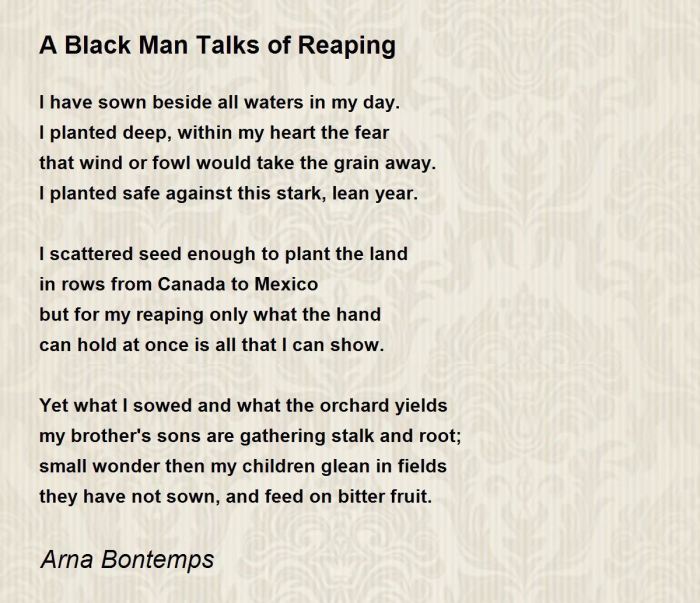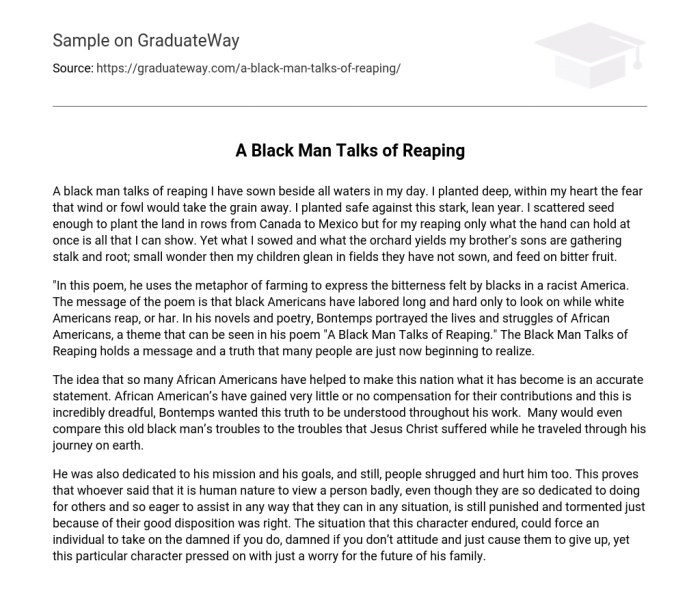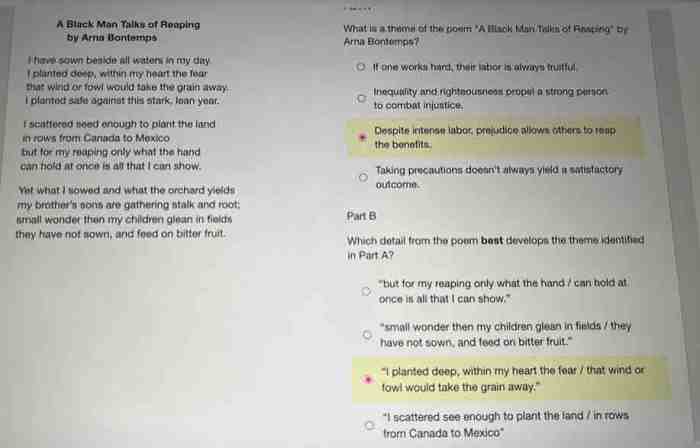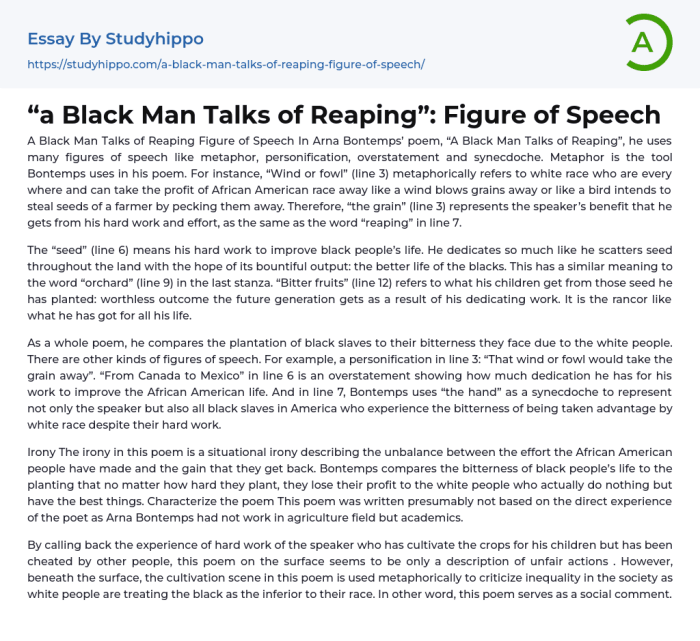As “A Black Man Talks of Reaping” takes center stage, this opening passage beckons readers into a world crafted with a blend of personal narrative and insightful analysis, ensuring a reading experience that is both absorbing and distinctly original.
Delving into the metaphorical and cultural nuances of reaping, this exploration unravels the profound significance of consequences, resilience, and the enduring power of the human spirit.
Definition of “Reaping”

In the realm of agriculture, “reaping” refers to the process of harvesting mature crops, marking the culmination of a season’s toil and the promise of sustenance. This crucial step involves severing the ripened grains, fruits, or vegetables from their stalks, pods, or vines, thereby gathering the fruits of the farmer’s labor.
The significance of reaping cannot be overstated. It represents the culmination of months of meticulous care, from tilling the soil to nurturing the young plants. A successful harvest ensures the replenishment of food supplies, providing sustenance for communities and sustenance for livestock.
The tale of a black man talking about reaping resonates deeply, echoing the struggles and triumphs of a marginalized community. However, in the realm of education, the pursuit of knowledge takes a different form. For those seeking to delve into the intricacies of algebra, the Abeka Algebra 1 Quiz 28 offers a valuable opportunity to test their understanding and reap the rewards of academic success.
Just as the black man’s story inspires resilience, the completion of this quiz can empower students to overcome obstacles and achieve their mathematical goals.
It is a time of celebration and gratitude, a testament to the resilience of nature and the ingenuity of humankind.
Examples of Reaping Practices
Reaping methods vary widely across cultures and regions, reflecting diverse agricultural traditions and environmental conditions. In some parts of the world, such as Southeast Asia, rice is traditionally harvested using a sickle, a handheld tool with a curved blade that allows for precise cutting of the stalks.
In other regions, such as the American Midwest, large-scale combine harvesters are employed to efficiently gather wheat, corn, and soybeans. These machines cut the stalks, thresh the grain, and clean it in a single pass, maximizing productivity.
The choice of reaping method depends on factors such as the crop type, the scale of the operation, and the availability of labor and machinery. Regardless of the approach, reaping remains a fundamental practice in agriculture, symbolizing the transition from growth and cultivation to nourishment and sustenance.
Metaphorical Interpretation of “Reaping”

The concept of “reaping” extends beyond literal harvesting to encompass a wide range of metaphorical applications in various aspects of life. It signifies the consequences, rewards, or outcomes that stem from our actions, decisions, and experiences.
In the context of personal growth, reaping can represent the culmination of our efforts and sacrifices. When we sow seeds of knowledge, discipline, and perseverance, we reap the fruits of success, fulfillment, and wisdom. Conversely, if we neglect our responsibilities or engage in harmful behaviors, we may reap negative consequences such as regret, disappointment, or failure.
Reaping in Relationships
In relationships, reaping can symbolize the rewards of love, trust, and commitment. When we nurture our connections through open communication, empathy, and support, we reap the benefits of strong bonds, intimacy, and lasting happiness. On the other hand, neglecting or damaging our relationships can lead to reaping the bitter harvest of loneliness, resentment, and heartbreak.
Reaping in Society, A black man talks of reaping
The metaphor of reaping also applies to societal contexts. When we sow seeds of justice, equality, and compassion, we reap a society that is harmonious, inclusive, and prosperous. Conversely, if we tolerate injustice, inequality, or discrimination, we reap the consequences of social unrest, division, and suffering.
Reaping in Nature
In the natural world, reaping reflects the interconnectedness of life. When we care for the environment, protect its biodiversity, and live sustainably, we reap the benefits of a healthy planet and abundant resources. However, when we exploit nature or damage its ecosystems, we reap the consequences of pollution, climate change, and loss of biodiversity.
Cultural and Historical Context of “Reaping”: A Black Man Talks Of Reaping

Reaping holds immense cultural and historical significance across various societies, representing the culmination of agricultural efforts and symbolizing abundance, prosperity, and sustenance.
Throughout history, reaping has been depicted in diverse artistic forms. In paintings, it is often portrayed as a bustling scene of farmers gathering ripe crops, while in literature, it serves as a metaphor for the rewards of hard work and dedication.
Musical compositions, such as folk songs and hymns, have also celebrated the significance of reaping, expressing gratitude for the bounty of the harvest.
Influence on Social Customs and Traditions
Reaping has influenced numerous social customs and traditions. In many cultures, the harvest festival marks a time of celebration and thanksgiving for the successful gathering of crops. These festivals often involve rituals, feasts, and community gatherings, honoring the agricultural cycle and expressing gratitude for the fruits of the earth.
Additionally, the concept of reaping has shaped social norms and values. The idea that hard work leads to rewards has become a fundamental principle in many societies, encouraging individuals to strive for success and contribute to the collective well-being.
“Reaping” in African American Culture

Within the context of African American culture, “reaping” carries profound significance. It represents the fruits of one’s labor, both physical and metaphorical, and symbolizes the resilience and perseverance that has characterized the African American experience.
Reaping has been used extensively to express themes of overcoming adversity. The idea of reaping what one has sown suggests that despite the challenges and obstacles faced, the efforts and sacrifices made will ultimately bear fruit.
African American Literature
In African American literature, reaping is a recurring motif. In works such as “The Souls of Black Folk” by W.E.B. Du Bois and “Invisible Man” by Ralph Ellison, the concept of reaping is explored through the struggles and triumphs of African American characters.
African American Music
African American music also reflects the theme of reaping. Spirituals and gospel songs often contain lyrics that speak of the hope for a better future and the belief that perseverance will ultimately be rewarded.
African American Art
In African American art, reaping is often depicted through images of farming and agriculture. These images symbolize the hard work and determination that has sustained the African American community throughout history.
“Reaping” in Modern Society

The concept of “reaping” remains relevant in contemporary society, carrying profound implications for personal growth, professional development, and social change. In modern contexts, reaping signifies the consequences of our actions, emphasizing the importance of responsibility, accountability, and ethical decision-making.
Personal Growth
Reaping can be applied to personal growth as a reminder of the connection between our actions and their outcomes. By understanding the consequences of our choices, we can make more informed decisions and take ownership of our lives. The concept encourages us to reflect on our actions, learn from our mistakes, and strive for personal improvement.
Professional Development
In the professional realm, reaping emphasizes the importance of hard work and dedication. By consistently putting in effort and taking responsibility for our tasks, we can expect positive outcomes and career advancement. The concept reminds us that success is not solely dependent on luck but rather on our own actions and the seeds we sow.
Social Change
Reaping extends beyond personal and professional spheres, influencing social change. By recognizing the consequences of our actions, we can become more mindful of the impact we have on society. This awareness encourages us to engage in responsible behavior, advocate for justice, and work towards creating a better future for all.
FAQ Explained
What is the significance of reaping in African American culture?
In African American culture, reaping holds deep historical and metaphorical significance, representing resilience, perseverance, and overcoming adversity.
How does the concept of reaping apply to modern society?
In contemporary society, reaping remains relevant, emphasizing personal growth, professional development, and social change.
